Unit 10 You’re supposed to shake hands.Section A(1a-2d)同步测试(含答案)
文档属性
| 名称 | Unit 10 You’re supposed to shake hands.Section A(1a-2d)同步测试(含答案) | 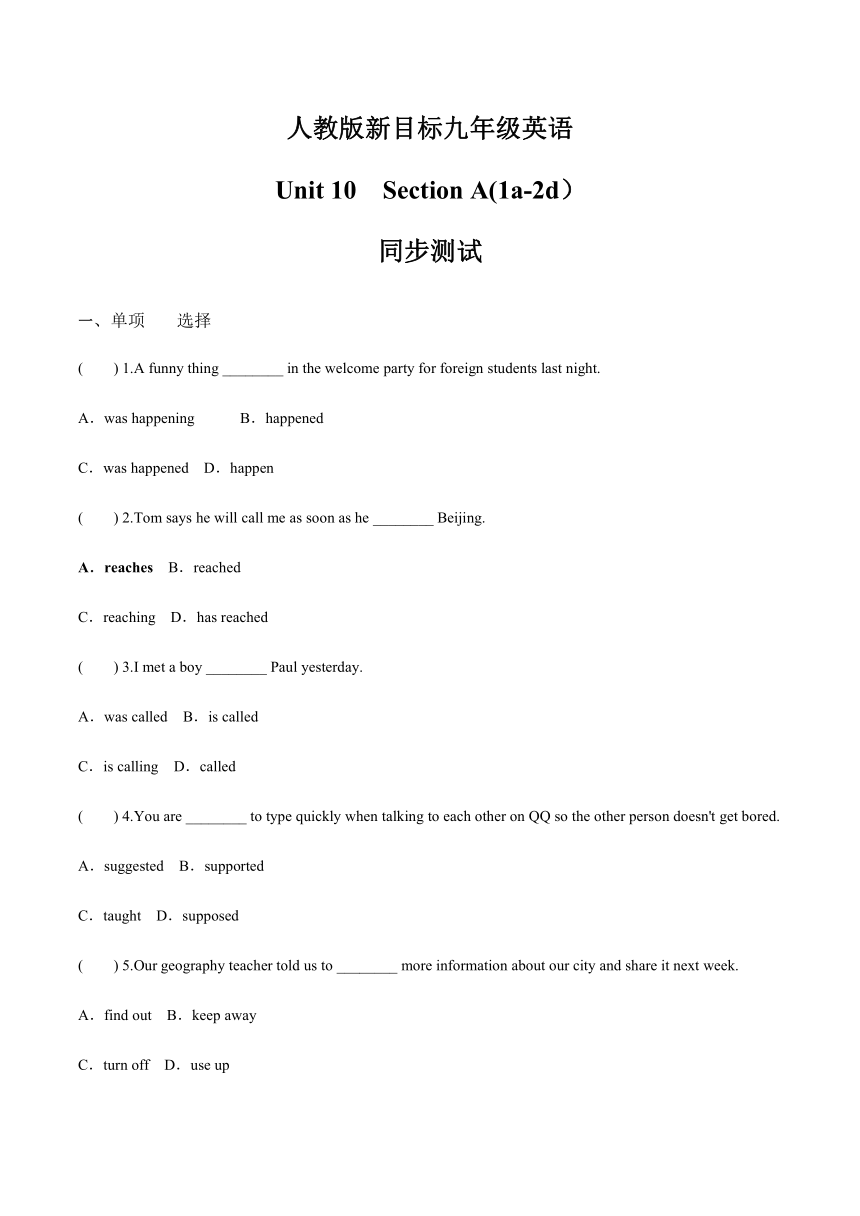 | |
| 格式 | zip | ||
| 文件大小 | 41.0KB | ||
| 资源类型 | 教案 | ||
| 版本资源 | 人教新目标(Go for it)版 | ||
| 科目 | 英语 | ||
| 更新时间 | 2019-12-08 10:34:05 | ||
图片预览

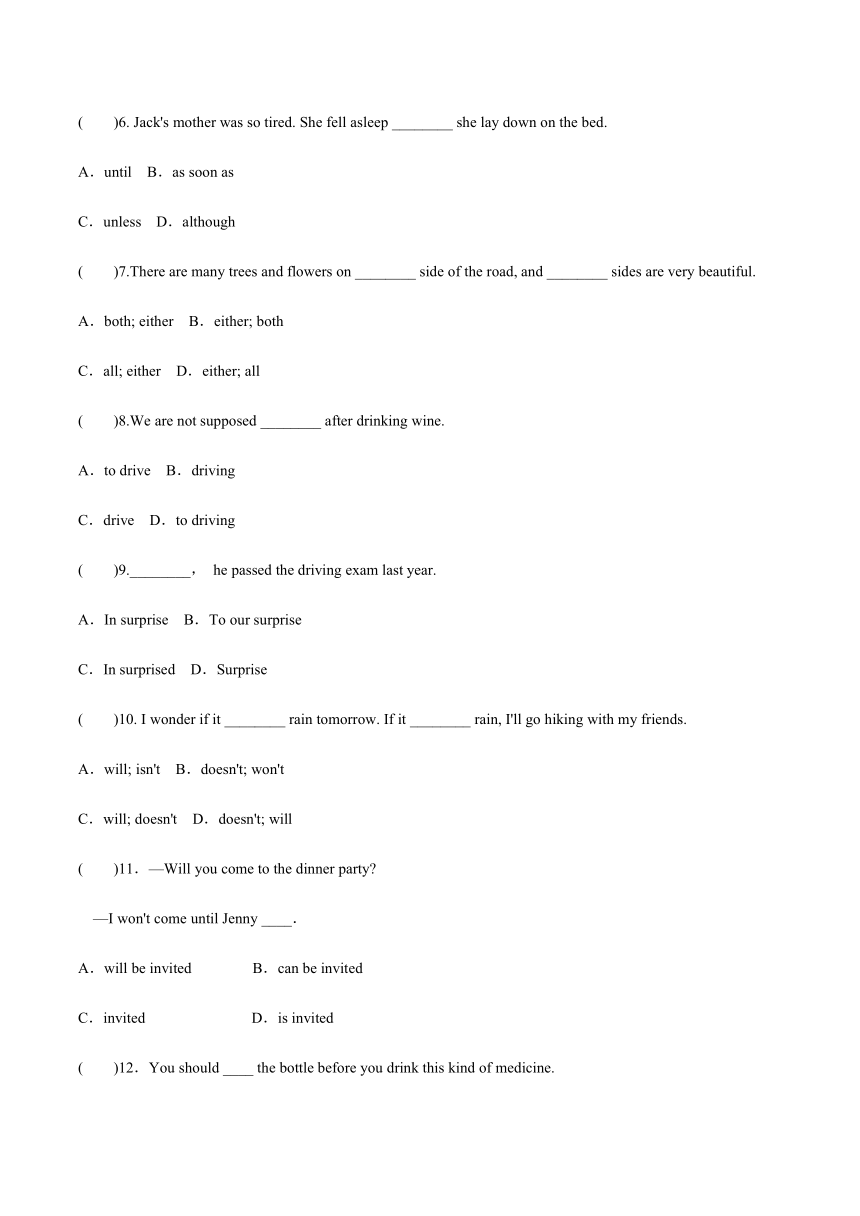
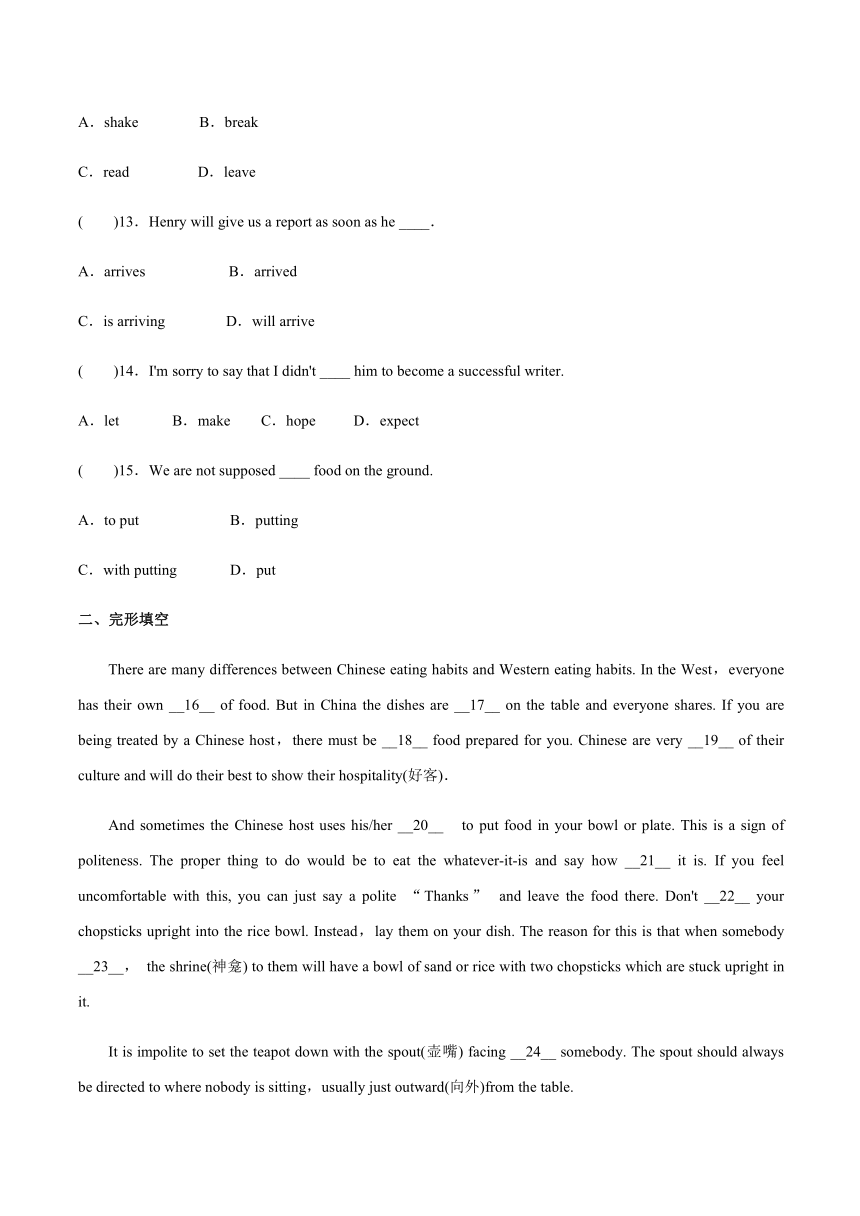
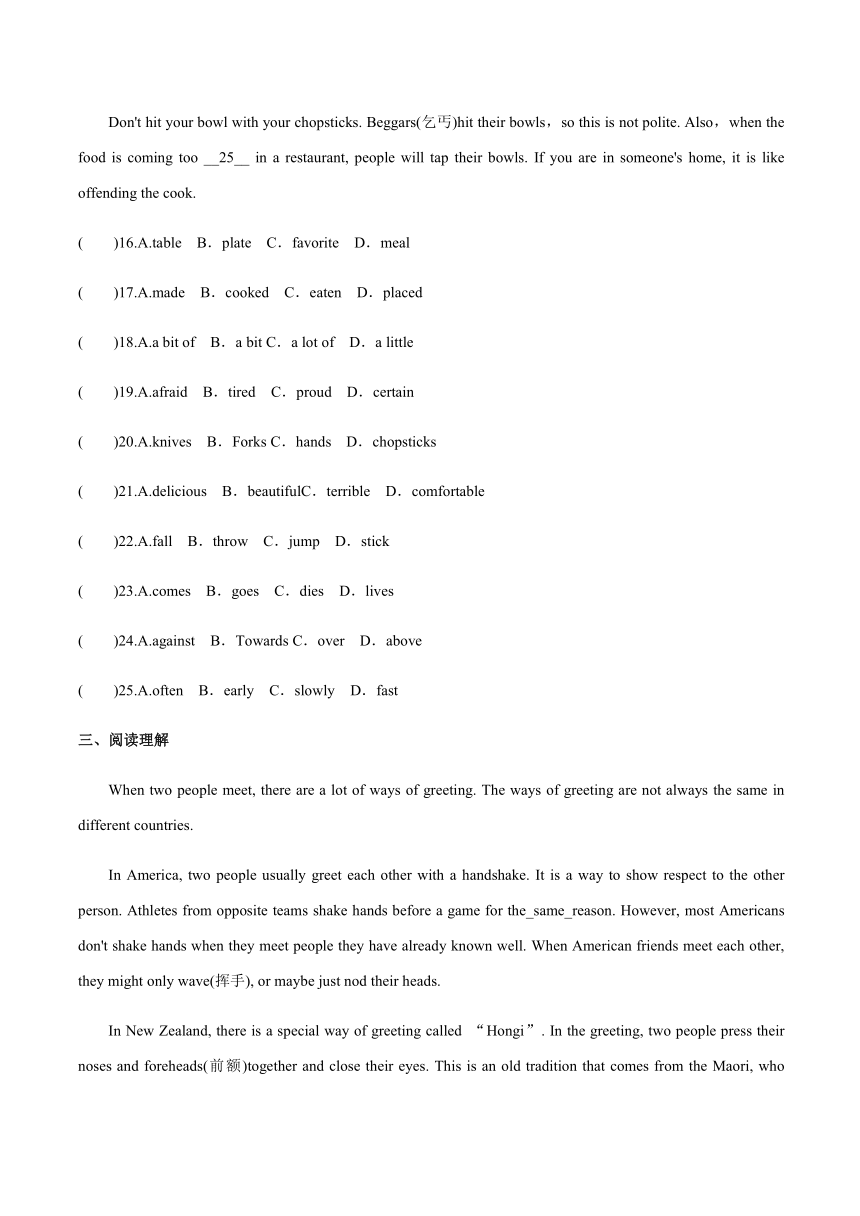
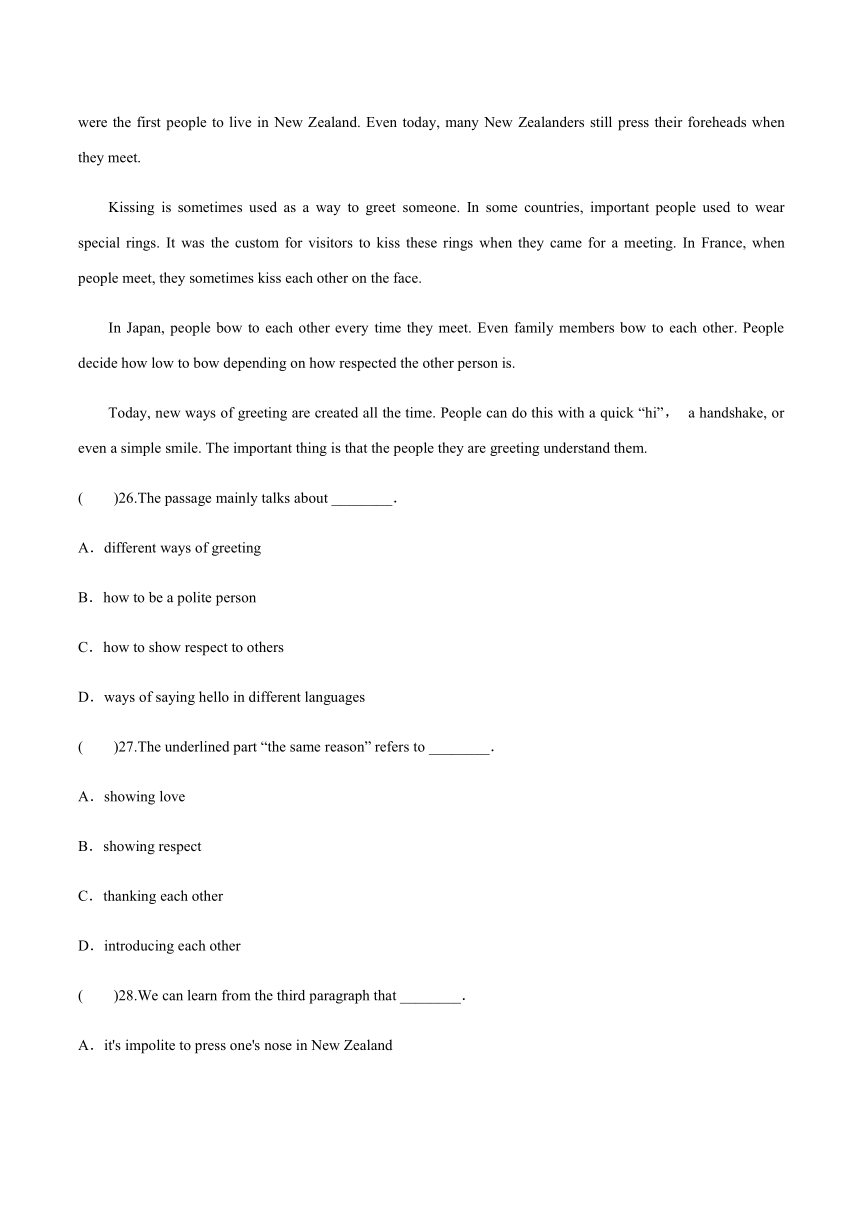
文档简介
人教版新目标九年级英语
Unit 10 Section A(1a-2d)
同步测试
一、单项选择
( ) 1.A funny thing ________ in the welcome party for foreign students last night.
A.was happening B.happened
C.was happened D.happen
( ) 2.Tom says he will call me as soon as he ________ Beijing.
A.reaches B.reached
C.reaching D.has reached
( ) 3.I met a boy ________ Paul yesterday.
A.was called B.is called
C.is calling D.called
( ) 4.You are ________ to type quickly when talking to each other on QQ so the other person doesn't get bored.
A.suggested B.supported
C.taught D.supposed
( ) 5.Our geography teacher told us to ________ more information about our city and share it next week.
A.find out B.keep away
C.turn off D.use up
( )6. Jack's mother was so tired. She fell asleep ________ she lay down on the bed.
A.until B.as soon as
C.unless D.although
( )7.There are many trees and flowers on ________ side of the road, and ________ sides are very beautiful.
A.both; either B.either; both
C.all; either D.either; all
( )8.We are not supposed ________ after drinking wine.
A.to drive B.driving
C.drive D.to driving
( )9.________, he passed the driving exam last year.
A.In surprise B.To our surprise
C.In surprised D.Surprise
( )10. I wonder if it ________ rain tomorrow. If it ________ rain, I'll go hiking with my friends.
A.will; isn't B.doesn't; won't
C.will; doesn't D.doesn't; will
( )11.—Will you come to the dinner party?
—I won't come until Jenny ____.
A.will be invited B.can be invited
C.invited D.is invited
( )12.You should ____ the bottle before you drink this kind of medicine.
A.shake B.break
C.read D.leave
( )13.Henry will give us a report as soon as he ____.
A.arrives B.arrived
C.is arriving D.will arrive
( )14.I'm sorry to say that I didn't ____ him to become a successful writer.
A.let B.make C.hope D.expect
( )15.We are not supposed ____ food on the ground.
A.to put B.putting
C.with putting D.put
二、完形填空
There are many differences between Chinese eating habits and Western eating habits. In the West,everyone has their own __16__ of food. But in China the dishes are __17__ on the table and everyone shares. If you are being treated by a Chinese host,there must be __18__ food prepared for you. Chinese are very __19__ of their culture and will do their best to show their hospitality(好客).
And sometimes the Chinese host uses his/her __20__ to put food in your bowl or plate. This is a sign of politeness. The proper thing to do would be to eat the whatever-it-is and say how __21__ it is. If you feel uncomfortable with this, you can just say a polite “Thanks” and leave the food there. Don't __22__ your chopsticks upright into the rice bowl. Instead,lay them on your dish. The reason for this is that when somebody __23__, the shrine(神龛) to them will have a bowl of sand or rice with two chopsticks which are stuck upright in it.
It is impolite to set the teapot down with the spout(壶嘴) facing __24__ somebody. The spout should always be directed to where nobody is sitting,usually just outward(向外)from the table.
Don't hit your bowl with your chopsticks. Beggars(乞丐)hit their bowls,so this is not polite. Also,when the food is coming too __25__ in a restaurant, people will tap their bowls. If you are in someone's home, it is like offending the cook.
( )16.A.table B.plate C.favorite D.meal
( )17.A.made B.cooked C.eaten D.placed
( )18.A.a bit of B.a bit C.a lot of D.a little
( )19.A.afraid B.tired C.proud D.certain
( )20.A.knives B.Forks C.hands D.chopsticks
( )21.A.delicious B.beautifulC.terrible D.comfortable
( )22.A.fall B.throw C.jump D.stick
( )23.A.comes B.goes C.dies D.lives
( )24.A.against B.Towards C.over D.above
( )25.A.often B.early C.slowly D.fast
三、阅读理解
When two people meet, there are a lot of ways of greeting. The ways of greeting are not always the same in different countries.
In America, two people usually greet each other with a handshake. It is a way to show respect to the other person. Athletes from opposite teams shake hands before a game for the_same_reason. However, most Americans don't shake hands when they meet people they have already known well. When American friends meet each other, they might only wave(挥手), or maybe just nod their heads.
In New Zealand, there is a special way of greeting called “Hongi”. In the greeting, two people press their noses and foreheads(前额)together and close their eyes. This is an old tradition that comes from the Maori, who were the first people to live in New Zealand. Even today, many New Zealanders still press their foreheads when they meet.
Kissing is sometimes used as a way to greet someone. In some countries, important people used to wear special rings. It was the custom for visitors to kiss these rings when they came for a meeting. In France, when people meet, they sometimes kiss each other on the face.
In Japan, people bow to each other every time they meet. Even family members bow to each other. People decide how low to bow depending on how respected the other person is.
Today, new ways of greeting are created all the time. People can do this with a quick “hi”, a handshake, or even a simple smile. The important thing is that the people they are greeting understand them.
( )26.The passage mainly talks about ________.
A.different ways of greeting
B.how to be a polite person
C.how to show respect to others
D.ways of saying hello in different languages
( )27.The underlined part “the same reason” refers to ________.
A.showing love
B.showing respect
C.thanking each other
D.introducing each other
( )28.We can learn from the third paragraph that ________.
A.it's impolite to press one's nose in New Zealand
B.Hongi is a kind of traditional food in New Zealand
C.the Maori used to be an old village in New Zealand
D.Hongi is an old tradition in New Zealand
( )29.How low does one Japanese bow to the other?
A.It depends on how respected the other person is.
B.It depends on how old the other person is.
C.It depends on how successful the other person is.
D.It depends on how tall the other person is.
( )30.Which of the following is NOT true according to the passage?
A.It's OK to just nod heads when American friends meet.
B.Family members in Japan do not bow to each other.
C.In some countries rings were once used for kissing.
D.The ways of greeting are changing over time.
四、词汇运用
A)根据句意及汉语提示填写单词。
31.Eating some chicken at the birthday dinner is a special _________(风俗) in my hometown.
32.People in Japan are supposed to _______(鞠躬) when they meet each other.
33.People usually shake hands to ________(和……打招呼) each other in China.
34.She is __________(期望) to be a good student and she tries her best to do it.
35.Don't make the same ____________(错误) again.
36.____________ (最后), we got to the mountain top.
37.He ____________ (摇) his head at once when he heard the advice.
38.You are ____________ (认为) to say hello to him first.
B)用括号内所给单词的适当形式填空。
39.In France,many people greet friends by _________(kiss) their faces.
40.What are you supposed __________(do) if you lose your way?
41.When you _____________(invite) for dinner in Colombia,you're supposed to come a little late.
42.He felt excited when he spoke in front of the class for the _____(one) time.
43.Did you watch the film ______(call) Coco(《寻梦环游记》)?
44.You are _________(suppose) to take off your shoes before you come in.
45.To his ____________ (surprised), she is still alive.
C) 根据句意及首字母提示填写单词。
46.Before you visit a foreign country, you should know its language and _________first.
47.We should ______our teachers when classes begin.
48.Mr. Miller goes to his son's room and ______him good night every day.
49.In Japan, people usually _____to each other when they meet.
50.You can't _______to learn a foreign language in a week.
D)用方框中所给的单词填空。
greet; bow; kiss; custom; expect
51.You are ___________to return all books by Monday.
52.It is difficult to get used to another country's ___________ .
53.She ___________us by shouting a friendly “Hello”.
54.Mr.Miller goes into his son's room and ___________him good night every day.
55.Japanese ___________when they meet people.
五、补全对话
从方框中选择恰当的句子补全对话。(有两项多余)
A:Hello,Kathy!I'm going to Japan as an exchange student next Sunday.
B:Sounds great.Congratulations,Carmen!
A:Thank you!But I don't know much about the customs or table manners in Japan.56.___________
B:Certainly.
A:57.___________
B:You are supposed to bow or sometimes shake hands.
A:58.__________
B:Of course you can.That means the noodles are delicious.
A:And when the host wants me to eat more food,but I don't want anymore,what should I do?
B:59._______
A:Oh,I see.Thanks for telling me so much.
B:60.__________
A.What am I supposed to do when I meet someone for the first time in Japan?B.Am I supposed to say thanks before leaving?C.Could you tell me something about them?D.You should say “Thank you.The food is delicious,but I'm full.”E.Can I make noise when I eat noodles?F.It's very kind of you. G.My pleasure.
五、完成句子
61.有人期望她成为一名好医生。
She ________________________be a good doctor.
62.汤姆一知道消息就会给我写信。
Tom will write to me ________________he ____________the news.
63.他们全都伸出双手欢迎我。
They all __________________their hands to welcome me.
64.让我吃惊的是,他竟然是我们英语老师的丈夫。
_____________________,he is our English teacher's husband.
65.世纪大道的两旁有许多花和树。
There are many flowers and trees __________________the Century Road.
66.他非常细心,从来没有犯过错。
He is very careful and never _______any __________.
67.我们应该握手还是拥抱?
Are we supposed to ________________or hug?
68.预计他们的讨论将持续到下午5点。
Their discussion __________to continue until 5 p.m.
69.首先,请伸出你的双臂。
At first, please ___________your arms.
70.不要用错误的方式教育孩子。
Don't educate the children __________________.
71.他第一次坐飞机时有点紧张。
He was a little nervous when he took the plane
72.我一回到家就喝水。
I drank water __________________I got home.
参考答案
一、单项选择
1-5BADDA 6-10BBABD 11-15 DAADA
二、完形填空
16-20 BDCCD 21-25 ADCBC
三、阅读理解
26-30 ABDAB
四、词汇运用
31.custom 32.bow 33.greet 34.expected 35.mistake 36.Finally 37.shook 38.supposed
39.kissing 40.to do 41.are invited 42.first 43.called 44.supposed 45.surprise
46.customs 47.greet 48.kisses 49.bow 50.expect
51.customs 52.greeted 53.expected 54.kisses 55.bow
五、补全对话
56-60 CAEDG
六、完成句子
61.is expected to
62.as soon as,knows
63.held out
64.To my surprise
65.on both sides of
66.makes,mistakes
67.shake hands
68.is expected
69.hold out
70.the wrong way
71.for the first time.
72.as soon as
同课章节目录
- Unit 1 How can we become good learners.
- Section A
- Section B
- Unit 2 I think that mooncakes are delicious!
- Section A
- Section B
- Unit 3 Could you please tell me where the restroom
- Section A
- Section B
- Unit 4 I used to be afraid of the dark.
- Section A
- Section B
- Unit 5 What are the shirts made of?
- Section A
- Section B
- Review of Units 1-5
- Unit 6 When was it invented?
- Section A
- Section B
- Unit 7 Teenagers should be allowed to choose their
- Section A
- Section B
- Unit 8 It must belong to Carla.
- Section A
- Section B
- Unit 9 I like music that I can dance to.
- Section A
- Section B
- Unit 10 You're supposed to shake hands.
- Section A
- Section B
- Review of Units 6-10
- Unit 11 Sad movies make me cry.
- Section A
- Section B
- Unit 12 Life is full of the unexpected
- Section A
- Section B
- Unit 13 We're trying to save the earth!
- Section A
- Section B
- Unit 14 I remember meeting all of you in Grade 7.
- Section A
- Section B
- Review of Units 11-14
